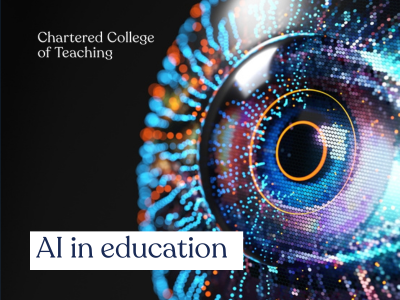Authors: Lily Wheeler, Holly Gardner and Helen Barker
The use of AI (artificial intelligence) in education seems to be on everybody’s mind at the moment. We were therefore delighted to host our Annual Lecture on exactly this topic on Monday 10th March 2025 at SalesForce Tower in London. The following blog post explores the main topics discussed by our expert panel and presents how they relate to some of the articles that will be published in a DfE-funded, open-access, online-only special issue of our member journal Impact this June.
Our expert panel, hosted by Dr Cat Scutt, brought together experts in AI from across the sector:
⚬ Neil Almond MCCT, Deputy Head Teacher, seconded to STEP Ahead Teaching School Hub
⚬ Joe Arday MBCS, FRSA, FCCT
⚬ Laura Knight FCCT, Founder of Sapio Ltd.
⚬ Ann Palmer FCCT, CEO, Fig Tree International
⚬ Jen Persson, Founder and Director, defenddigitalme
⚬ Fay Skevington, Head of AI Alignment for Education, DfE
Their bios are available from our events listing here: Annual Lecture: AI in Education

The following questions were discussed:
“Would you put AI back in a box if you could?”
AI holds the potential to improve lives, when harnessed ethically and with care. There are opinions that it was never truly “boxed in”, and our perception of AI varies with age. It can be argued that AI is an inevitable step in technological evolution, therefore we must be proactive in shaping its development. AI provides possibilities, but is paired with equal risks, meaning we must be careful with its use and implementation, especially within education. When used effectively, it can enhance learning, particularly for students with SEN needs. The true complexity of AI makes discussions around regulation and intervention essential.
The following article in our upcoming online special issue of Impact will further explore how AI can support with inclusion and address workload and retention issues:
How AI can be a panacea for the growing SEND, workload and retention crisis
Rebecca Stott Director of Education TWINKL
Georgina Durrant SEND author, Bloomsbury, Thought leader for inclusion, TWINKL
Jonathan Park, AI Lead TWINKL, UK
“How does AI support or hinder the development of teacher professionalism?”
AI can support teachers by reducing workload, but it must not replace the expertise and training that goes into joining the profession. Although AI has the potential to enhance teacher well-being, retention, and learning experiences, the ‘time saved’ by using AI often gets filled with other responsibilities. AI can assist with administrative tasks like marking, generating texts, and providing feedback, but its value and integrity should be questioned- does it truly improve efficiency and effectiveness? Personalised teacher training and CPD using AI can provide an exciting opportunity, but its implementation must be collaborative and strategic across the educational setting. It is important to note that although useful, AI still makes mistakes which without expert input and testing, may not be spotted.
“How does AI support or hinder equality, equity and inclusion in schools?”
AI has the potential to support Diversity, Equity, and Inclusion by detecting hidden human biases and challenging patterns, but its effectiveness depends on how it is configured and applied. Relying on AI to solve human problems and biases raises concerns over responsibility- should this correction fall on teachers, schools, or EdTech companies? Our young people are highly impressionable and it is important to take this into consideration when utilising AI; the lack of diversity could significantly impact students’ mental health, making their media literacy and critical engagement essential. The various investments in AI can impact and reshape DEI efforts, but being proactive in mitigating bias is necessary. While AI provides broader access to knowledge regardless of social background, it could also widen the gap between disparities if not carefully managed.
“What ethical considerations do we need to take into account before rolling AI out in schools?”
The ethical considerations around AI use in schools should cover broader educational outcomes, as well as data. AI should serve the best interests of students and parents, ensuring their right to education choices remains central. Pupil voice should have a say in the AI tools adopted in schools, speaking to students and engaging with school councils to decide. As digital culture evolves, AI challenges more traditional ethical frameworks, so we should have deeper philosophical discussions on its role in education. Ethics vary across cultures, making it crucial for schools to engage only with AI suppliers who align with their values. Algorithmic bias must be addressed to promote diversity in its output, and the impact of AI on phone use, and student development should be carefully examined.
The following article from our upcoming special issue of Impact further explores the topic of student agency in the context of AI:
The importance of student voice in getting AI right for schools
Daniel Emmerson, Executive Director, Good Future Foundation, UK
“What should schools consider as immediate priorities in the implementation of AI and where might they look for best practice examples?”
Schools must approach AI implementation with a clear purpose, identifying the problems they aim to solve and opportunities they want to create. A strong AI policy is essential in ensuring safe and ethical use within educational settings. Safeguarding must be a priority when using AI- tools should be carefully selected, with the risks understood before introducing them to students. Leadership plays a crucial role in AI implementation to ensure that it is used with meaningful and direct outcomes. Schools should provide staff training, establish parent engagement, and integrate AI into their broader strategy and aims rather than adopting solutions in a separated approach so that it suits the best interests of students and staff.
“What are the myths around AI which most need challenging in education?”
“In what way do we need to rethink teaching approaches to account for the rise of AI and how does teacher training need to change to account for these changes?”
“In what way do we need to rethink current assessment approaches to account for AI developments?”
Overview of key findings from the lecture
The main theme from the annual lecture was that teachers and leaders should be thinking carefully and engaging critically with AI itself, as well as the claims about how it will revolutionise education.
There is certainly promise around the use of AI in a number of areas, including reducing aspects of workload and administration tasks, alongside how it might enhance or change pedagogy in classrooms. However, this needs to be balanced with an understanding of the risks involved, such as data protection and safeguarding, which need to be considered before implementation.
The following articles in our upcoming special issue of Impact explore the potential of AI for reducing teacher workload as well as some ethical considerations relating to the use of AI in schools:
Teachers’ use of ChatGPT in lesson preparation can save time
Helen Poet, Research Director NFER and Katherine Aston Research Manager, NFER
The human in the machine: Exploring the potential, ethics and morality of harnessing AI for workload and assessment
Matt Hinkley, Teacher, Thinking schools Academy Trust, UK
In the classroom, considering whether or not to use AI links to ideas around weighing up whether a specific AI use aligns with the objectives of the lesson and the needs of the students. Teachers need to develop their understanding of how AI technologies might be useful, alongside the crucial critical engagement which will ensure that AI is used both safely and effectively. Upcoming free training materials around the safe and effective use of AI, funded by the DfE and developed by Chiltern Learning Trust, will be incredibly useful for individual teachers and school leaders. A range of case studies will be provided to help put the ideas discussed into context. Teachers, leaders and other school staff will also have the opportunity to accredit this training through a short online assessment offered by the Chartered College of Teaching.
The following article in our upcoming special issue of Impact explores what teachers really need to know in order to reflect critically on and implement AI successfully in their settings:
Using GenAI: What do teachers really need to know?
Hannah Owen, Class teacher, Riverside Primary School: PHD, Researcher, University of Cambridge, UK
For school senior and middle leaders, strategic thinking around AI use was a main theme, from policies and processes through to how AI might assist with aspects such as data analysis. Considering how school assessments and feedback might be affected by AI use is certainly a major theme in discussions, including how educators might leverage AI for assessment and feedback, while avoiding the pitfalls of scholarship or data protection issues. Another concern for leaders in particular is linked to diversity and inclusion, with understanding of how AI might widen and entrench disparities between outcomes for vulnerable students being an important aspect to consider.
The following article in our upcoming special issue of Impact explores the role of AI in assessment
AI in assessment: Managing risks and seizing opportunities,
Dale Bassett, Director of Assessment, United Learning, UK
Overall, there’s a cautious optimism and professional curiosity around the use of AI in education, with teachers and leaders keen to explore potential opportunities for use of AI within their settings.
Conversations also highlighted the need for greater understanding of AI technologies, including the possible drawbacks, so that teachers and leaders can make informed decisions about its use.
Members can access a recording of the full lecture here.
